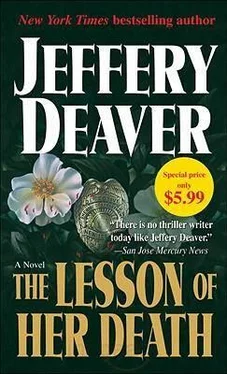"He always was. And one step behind us too."
"How'd you know he was in that house, Bill? I've lived in New Lebanon ten years and never even knew there were houses down there by the river."
"It's tough to explain how the process of deduction works, Wynton."
"You mean it's something you're born with?"
"No. You can learn. The more you practice the better you are. Remember that."
"Well, I will."
Corde stepped out into the backyard of his house and set down his Pabst Blue Ribbon. He inspected the strip of muddy dirt by the dryer exhaust. He shooed off a couple of grackles and bent down low to the ground then went lower, on all fours; it seemed to him the green fuzz hadn't grown a millimeter in the last weeks. He decided it was crazy to try to grow grass here in this sunless rocky gully between two houses populated by hard-running teenage boys who loved shortcuts; he ought to put in gravel and be done with it.
Nevertheless Corde arranged the sprinkler carefully and turned on the water.
He sat down in a plaid lawn chair, the aluminum legs screeching on the slab of concrete he'd laid two years ago and spent two years meaning to enclose. He looked at his watch. Tonight the family was going to visit Jamie in the hospital. They were going to smuggle in a VCR and Corde was going to hook it up to the TV in the hospital room. They were all going to watch a movie Diane had rented, some cop comedy. But that excursion was planned for after dinner. Now, he wanted to relax for a few minutes. He opened the beer and drank half of it then replaced the can on the concrete while he watched the intermittent rainbow the sprinkler made as it waved a fan of water high enough to catch the last of the sun. He glanced behind him and saw Diane behind the twin Thermopanes, occupied with dinner.
Corde felt a stack of three-by-five cards gig him in the thigh and he took them out of his pocket. Most of them would be filed away in the tall green cabinets he had testily commandeered for his own use down at the Sheriffs Department. One card though, filled with his careful block lettering, he intended to pin up on his bulletin board. He thought he would put it in the space next to his favorite quote – about physical evidence being the cornerstone of a case. This card read:
IT IS THE POET WHO PERCEIVES THE WORLD BY THE ILLUMINATION OF PURE UNDERSTANDING,
WHILE OTHERS SEE ONLY IN REFLECTED LIGHT.
L.D. GILCHRIST
He slipped the card into his pocket then picked up his beer, took several sips and cradled the sweating can on his stomach, listening to the sounds of dusk: cicadas, cricket creaks, an owl waking to his hunger, a dinnertime summons to the neighbor children. Diane banged on the window and shouted, "Ten minutes."
Bill Corde said okay. He waited half that time then stood and stretched. He walked to the edge of the concrete deck and leaning outward began to wave the white cards high in the air, shouting "Whoa, whoa!" at a half dozen shiny grackles, which fled from his muddy patch of frail lawn and vanished into the moonless sky.

Former attorney and folksinger Jeffery Deaver is the best-selling author of a dozen suspense novels and numerous short stories. He has been nominated for an Edgar Award three times and is a two-time recipient of the Ellery Queen Readers’ Award for best short story of the year. The London Times has called him the “best psychological thriller writer around.” He makes his home in Virginia and California. The Bone Collector , the first Lincoln Rhyme thriller, is soon to be a feature film from Universal Pictures.
***















